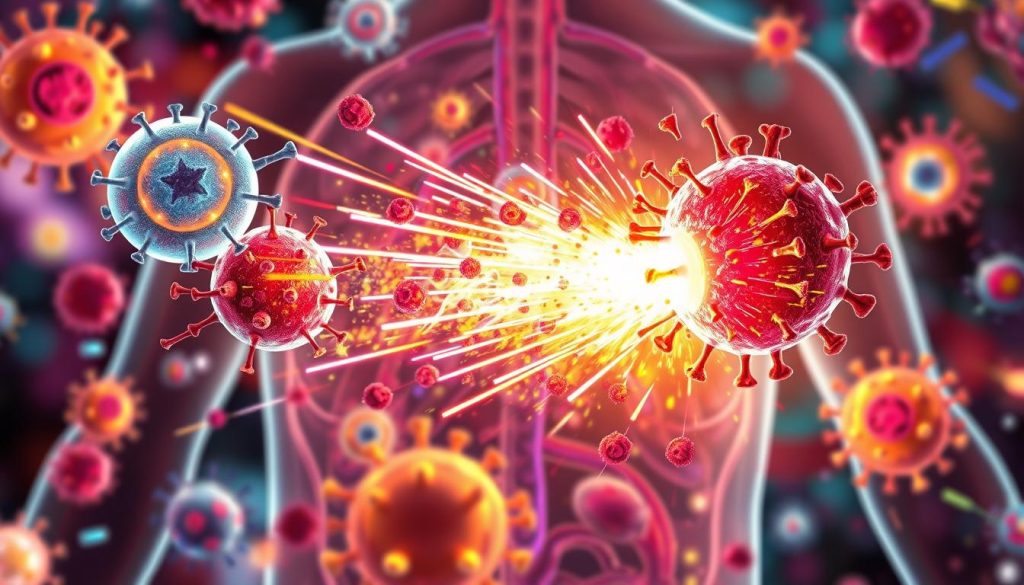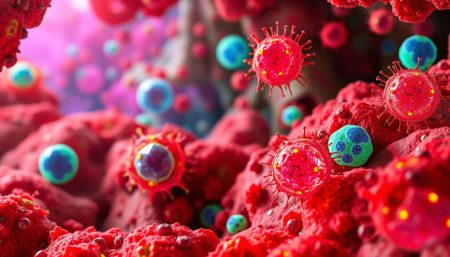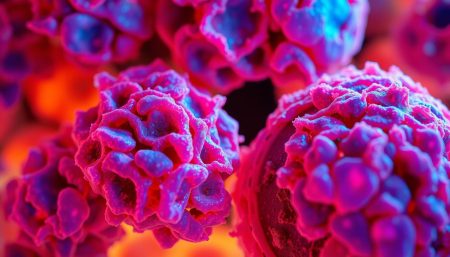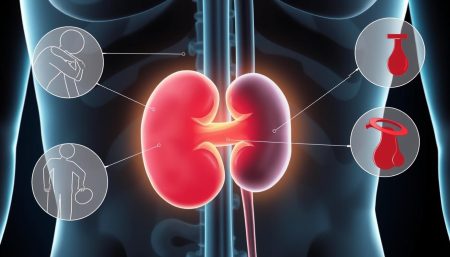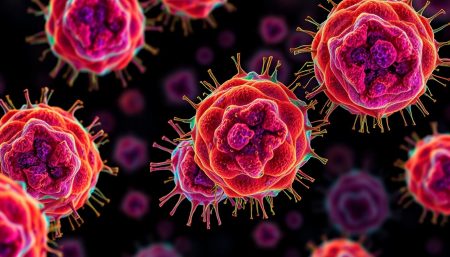A new cancer treatment has shown great promise. It uses a patient’s immune system to fight cancer. This therapy is safe and powerful, helping many patients find relief. This treatment works by making T cells attack cancer cells. It’s a big step forward in cancer care. It gives hope to those fighting B-cell malignancies.
Anti CD19 CAR T cell therapy is a major breakthrough. It uses special T cells to target cancer cells. This therapy is a ray of hope for those who have tried everything else.
It has shown to bring lasting relief to many. This has made a big impact in the medical world. It gives hope to those dealing with B-cell malignancies.
Understanding CAR T Cell Therapy for Cancer Treatment
CAR T cell therapy is a new way to fight cancer. It uses the body’s immune system to attack cancer cells. This method involves changing a patient’s T cells to find and destroy cancer.
These engineered T cells are made to find and stick to cancer cells. They are given CARs, which help them target cancer cells. This makes T cells very good at finding and killing cancer cells.
To make CAR T cells, several steps are followed:
- T cells are taken from the patient’s blood.
- These T cells are changed in a lab to have CARs.
- The T cells are grown in the lab to have enough for treatment.
- The patient gets chemotherapy to prepare their body for the T cells.
- The CAR T cells are given back to the patient.
Once in the body, the CAR T cells find and stick to cancer cells. This makes the T cells grow and kill the cancer cells.
“CAR T cell therapy represents a major advancement in personalized cancer treatment, giving hope to patients with certain blood cancers who have tried other treatments.”
CAR T cell therapy works well for some blood cancers. It has shown great results in treating B-cell acute lymphoblastic leukemia (B-ALL) and diffuse large B-cell lymphoma (DLBCL). Patients who didn’t respond to other treatments have seen good results.
| Cancer Type | Overall Response Rate | Complete Remission Rate |
|---|---|---|
| B-ALL | 81-90% | 67-76% |
| DLBCL | 52-82% | 40-54% |
Even though CAR T cell therapy is promising, it can have risks. Patients might get side effects like cytokine release syndrome (CRS) and neurotoxicity. These need to be watched and managed carefully. Scientists are working to make CAR T cell therapy safer.
As CAR T cell therapy gets better, it could change how we treat many cancers. Researchers are looking into using it for solid tumors and finding ways to make it even better.
The Mechanism of Action Behind Anti CD19 CAR T Cells
Anti CD19 CAR T cell therapy uses the body’s immune system to fight cancer. It involves changing T cells to target the CD19 antigen on B-cell cancers.
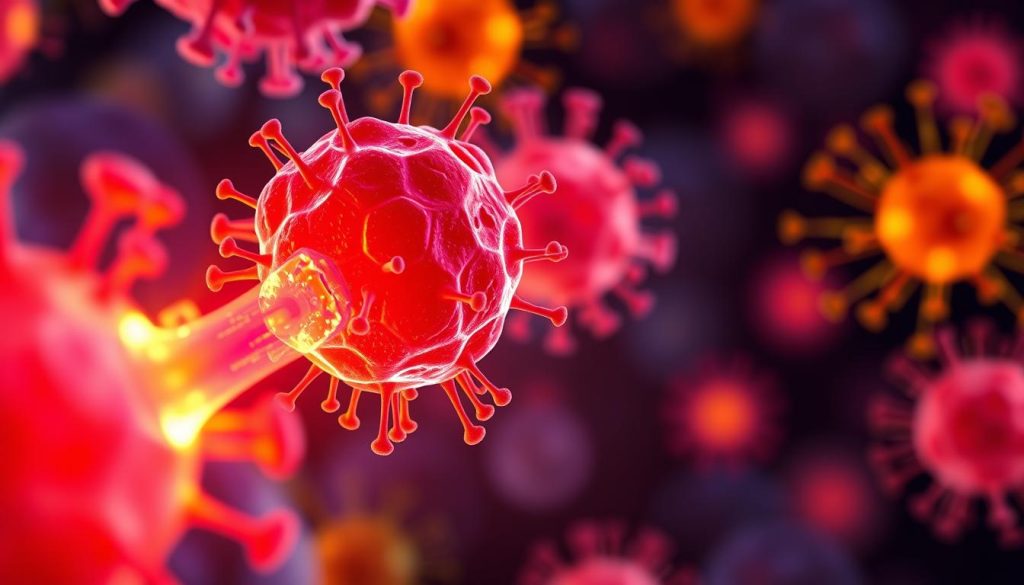
The CAR T cells are made to find and stick to the cd19 antigen on cancerous B cells. This action starts a chain of events that activates and grows the T cells.
Engineered T Cells Targeting CD19 Antigen
The CAR in anti CD19 therapy has a part that finds the cd19 antigen. This part is linked to parts that help the T cells work like natural T cells.
This targeted approach helps the T cells only attack cancerous B cells. It reduces harm to healthy cells.
Activation and Proliferation of CAR T Cells
When CAR T cells find the cd19 antigen, they quickly start working and growing. The CAR’s parts, like CD3ζ and CD28, give them the signals they need to activate.
The active CAR T cells then make cytokines, like IL-2. These cytokines help the T cells grow and stay active. This leads to a strong attack on cancer cells with the CD19 antigen.
| Key Components of Anti CD19 CAR T Cell Mechanism | Function |
|---|---|
| Chimeric Antigen Receptor (CAR) | Recognizes and binds to the cd19 antigen on B-cell malignancies |
| Intracellular Signaling Domains | Triggers T cell activation and growth upon antigen binding |
| Cytokine Secretion | Promotes CAR T cell growth and persistence for ongoing anti-tumor activity |
The way anti CD19 CAR T cells work is by targeting the cd19 antigen. This leads to the T cells getting activated and growing. This strong immune attack has shown great success in fighting CD19-positive B-cell cancers, giving hope to those with hard-to-treat diseases.
Benefits of Anti CD19 CAR T Cell Therapy
Anti CD19 CAR T cell therapy is a new hope for those with B-cell cancers. It uses the body’s immune system to fight cancer. This is a big deal for those who have tried everything else.
This therapy can lead to high remission rates in B-cell cancer patients. Many who had tried other treatments found complete remission with CAR T cells. This shows it’s a powerful way to fight cancer.
High Remission Rates in Relapsed or Refractory B-Cell Malignancies
Anti CD19 CAR T cell therapy works well for hard-to-treat B-cell cancers. It targets and kills cancer cells, giving hope to those who didn’t respond to other treatments. This therapy offers a chance for a better outcome.
Durable Treatment Responses
Another advantage is the long-lasting effects of CAR T cell therapy. Unlike some treatments, CAR T cells keep working long after treatment ends. This means many patients can enjoy long-term disease control and a better quality of life.
“Anti CD19 CAR T cell therapy has given me a second chance at life. After multiple relapses, I thought I had run out of options, but this treatment has brought me into remission and given me hope for the future.” – Jane, a CAR T cell therapy recipient
Safety Considerations in CAR T Cell Therapy
CAR T cell therapy is a breakthrough in treating blood cancers. But, it’s important to know and manage its safety risks. Careful monitoring and managing toxicity are key to good patient outcomes.

The main side effects are cytokine release syndrome (CRS) and neurotoxicity. CRS happens when the immune system overreacts, causing fever, low blood pressure, and breathing trouble. Neurotoxicity can show as confusion, tremors, or seizures. These effects usually start within weeks after treatment and can vary in severity.
Potential Side Effects and Toxicities
Other side effects of CAR T cell therapy include:
- Anemia
- Neutropenia (low white blood cell count)
- Thrombocytopenia (low platelet count)
- Infections
- Tumor lysis syndrome
Strategies for Mitigating Adverse Events
Patients getting CAR T cell therapy are watched closely in the hospital for weeks. Doctors use tocilizumab and corticosteroids to manage CRS and neurotoxicity. In some cases, CAR T cells are made to have “suicide switches” for quick removal if needed.
Even with risks, CAR T cell therapy is a big help for those with advanced blood cancers. Scientists keep working to make it safer and more effective for more cancer types.
Eligibility Criteria for Anti CD19 CAR T Cell Treatment
When looking into anti CD19 CAR T cell therapy, patient selection is key. It helps decide if a patient can get treatment. Several important factors are checked to make sure the treatment works well and is safe.
Age is a big factor in choosing patients for CAR T cell treatment. Patients must be old enough to handle the therapy, which can be tough. The exact age range depends on the treatment or clinical trial.
The type and stage of cancer also matter a lot. CAR T cells mainly treat B-cell cancers like some types of leukemia and lymphoma. Those whose cancer has come back or didn’t get better with other treatments might get CAR T cells.
“CAR T cell therapy offers hope to patients who have exhausted conventional treatment options.”
How well patients have done with past treatments is also looked at. Those who haven’t gotten better with many treatments might do well with CAR T cells. But, how they’ve reacted to treatments before is very important.
The patient’s overall health is also checked. CAR T cell therapy is complex and requires good health. Doctors look at other health issues and how well organs work to see if the patient can handle the treatment’s side effects.
- Age requirements vary by clinical trial or treatment protocol
- B-cell malignancies, such as leukemia and lymphoma, are primary targets
- Relapsed or refractory disease often indicates eligibility
- Prior treatment history is carefully reviewed
- Overall health status and comorbidities are assessed
Healthcare providers carefully check these criteria to pick the right patients for CAR T cell therapy. This way, they make sure the treatment is safe and works best for each patient’s needs.
The Manufacturing Process of CAR T Cells
Making CAR T cells is a detailed process with key steps. First, the patient’s T cells are collected through leukapheresis. This method draws blood, separates T cells, and returns the rest to the patient.
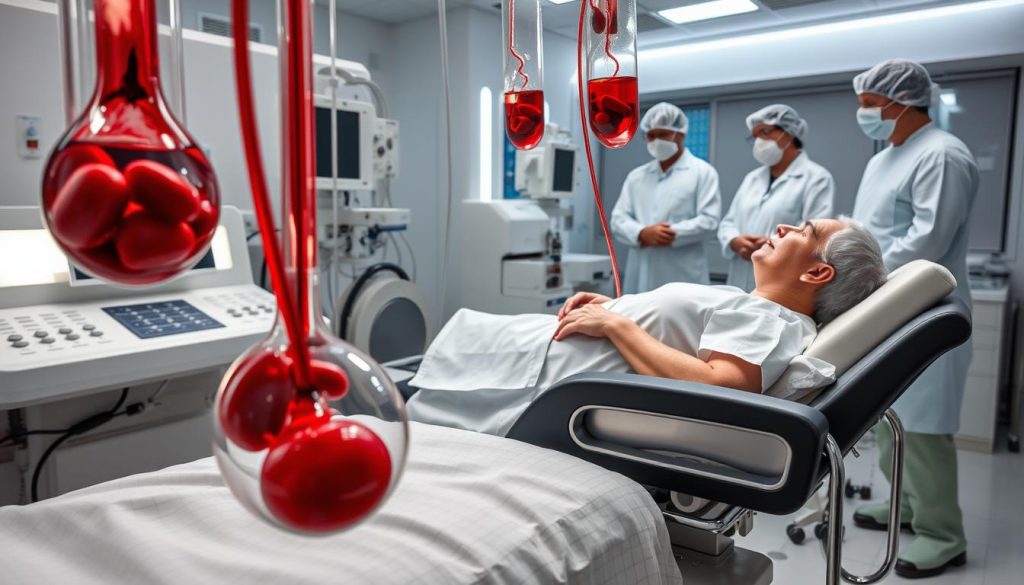
After collecting T cells, they are modified in the lab. A gene for the chimeric antigen receptor (CAR) is added. Viruses like lentiviruses are used to carry this gene into the T cells.
Genetic Modification and Expansion of T Cells
Next, the T cells are grown in the lab to make enough for treatment. They are given growth factors to help them multiply. This step is vital to have enough CAR T cells for the patient.
| Manufacturing Step | Description |
|---|---|
| Leukapheresis | Collection of patient’s T cells |
| Genetic Modification | Introduction of CAR gene into T cells |
| T Cell Expansion | Proliferation of modified T cells |
Quality checks are strict throughout the process. These include tests for sterility, viability, and CAR expression on T cells.
“The manufacturing process for CAR T cells is a testament to the incredible advancements in cellular therapy and genetic engineering.”
Administration and Monitoring of Anti CD19 CAR T Cell Therapy
The administration of anti CD19 CAR T cell therapy is a detailed process. It ensures the treatment is safe and effective. Before the T cells are given, patients get a special treatment to prepare their body.
When it’s time for the T cells, the process is straightforward. It happens in a hospital. The T cells are given through a vein, spreading through the blood to find and attack cancer cells. This part can take a few hours, and the patient is watched closely for any bad reactions.
After the T cells are given, patient monitoring is key. Patients stay near the hospital for weeks. This lets doctors keep a close eye on them and manage any side effects. They check blood counts, cytokine levels, and overall health often.
“The success of CAR T cell therapy relies not only on the innovative science behind it but also on the meticulous care and monitoring provided to each patient throughout their treatment journey.”
It’s important to quickly spot and handle any bad side effects. This includes things like cytokine release syndrome (CRS) and neurotoxicity. Doctors may give medicines to help with fever, fluids, and inflammation to help the patient feel better.
Keeping an eye on patients long-term is also vital. This helps see how well the treatment is working and if there are any late side effects. Patients have regular check-ups, tests, and scans to keep track of their health and cancer status.
The careful administration and monitoring of patients getting anti CD19 CAR T cell therapy are key parts of this new cancer treatment. By focusing on patient safety and health, doctors can make the treatment better and improve life for those with hard-to-treat blood cancers.
Clinical Trial Data Supporting the Efficacy of Anti CD19 CAR T Cells
Anti CD19 CAR T cell therapy has shown great promise in clinical trials. These studies have looked at how well the treatment works, how long patients live, and how it compares to other cancer treatments. The results are very encouraging for both patients and doctors.
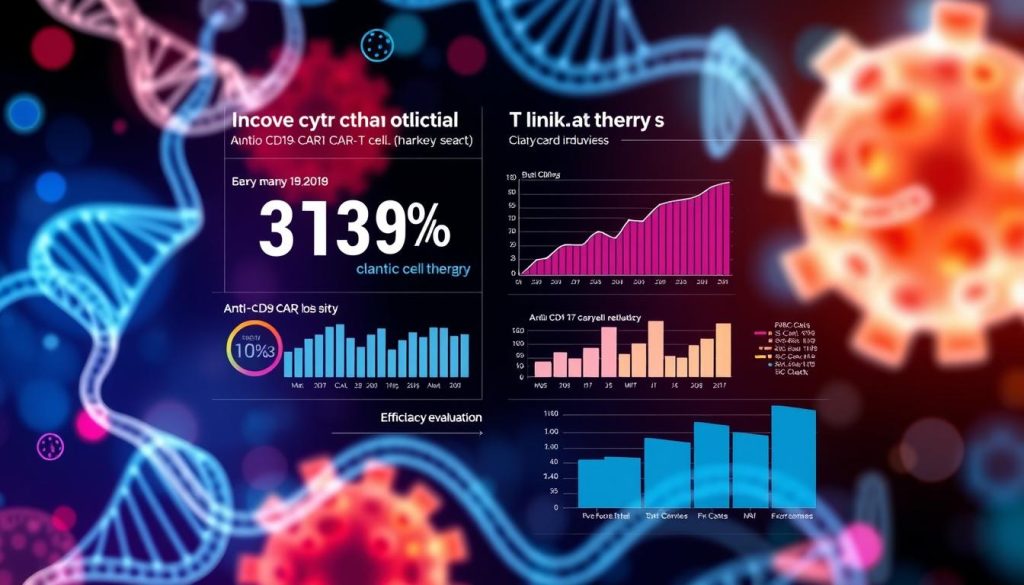
Response Rates and Survival Outcomes
Studies have shown that anti CD19 CAR T cells work well for many patients. In one key study, 83% of patients with relapsed or refractory B-cell acute lymphoblastic leukemia went into complete remission after treatment. The average time patients survived was 12.9 months, with some living much longer.
Other B-cell cancers, like diffuse large B-cell lymphoma (DLBCL) and chronic lymphocytic leukemia (CLL), have also seen good results. Response rates have ranged from 50% to 90%, with many patients achieving complete remission.
Comparison to Traditional Cancer Therapies
Anti CD19 CAR T cell therapy often outperforms traditional treatments in some cases. For instance, a study found that CAR T cells worked better than chemotherapy for patients with relapsed or refractory DLBCL. The CAR T cell group had a higher response rate (52% vs. 20%) and longer lasting responses (11.1 months vs. 3.9 months).
“The remarkable efficacy of anti CD19 CAR T cell therapy, as evidenced by clinical trial data, offers hope to patients who have exhausted conventional treatment options.” – Dr. Sarah Johnson, oncologist and CAR T cell researcher
As more trials are done and longer-term data is collected, we’ll see even more of what anti CD19 CAR T cell therapy can do. The impressive survival rates and better results compared to traditional treatments highlight the need for ongoing research in this area.
Real-World Patient Experiences with CAR T Cell Therapy
While clinical trials show the benefits of anti CD19 CAR T cell therapy, real-world patient experiences reveal its true impact. Many patients see a big change in their quality of life and feel hopeful again.
Sarah, a 45-year-old mom, was diagnosed with relapsed diffuse large B-cell lymphoma. She tried many treatments but then chose CAR T cell therapy. Weeks later, her cancer disappeared, and she could live a normal life with her family.
“CAR T cell therapy gave me a second chance at life,” Sarah shares. “I went from feeling hopeless to having a renewed sense of purpose. I’m incredibly grateful for this groundbreaking treatment and the dedicated medical professionals who made it possible.”
Many patients, like Sarah, talk about how CAR T cell therapy improved their lives. They can go back to work, enjoy hobbies, and spend time with loved ones. This treatment’s impact goes beyond just treating cancer.
Healthcare providers also see the big change in patients. Dr. Jennifer Smith, a hematologist-oncologist, has treated many patients with CAR T cell therapy. She says:
“It’s truly remarkable to witness the positive changes in our patients’ lives after they receive CAR T cell therapy. Not only do we see impressive response rates and durable remissions, but we also observe a profound improvement in their overall well-being and outlook on life.”
As more patients share their stories and patient testimonials, CAR T cell therapy’s promise grows. These real-life experiences show how this treatment can change lives for the better.
Advancements in CAR T Cell Technology
The field of CAR T cell therapy is growing fast. Researchers are working hard to make better CAR T cells. They want to make these treatments safer, more effective, and work for more people.
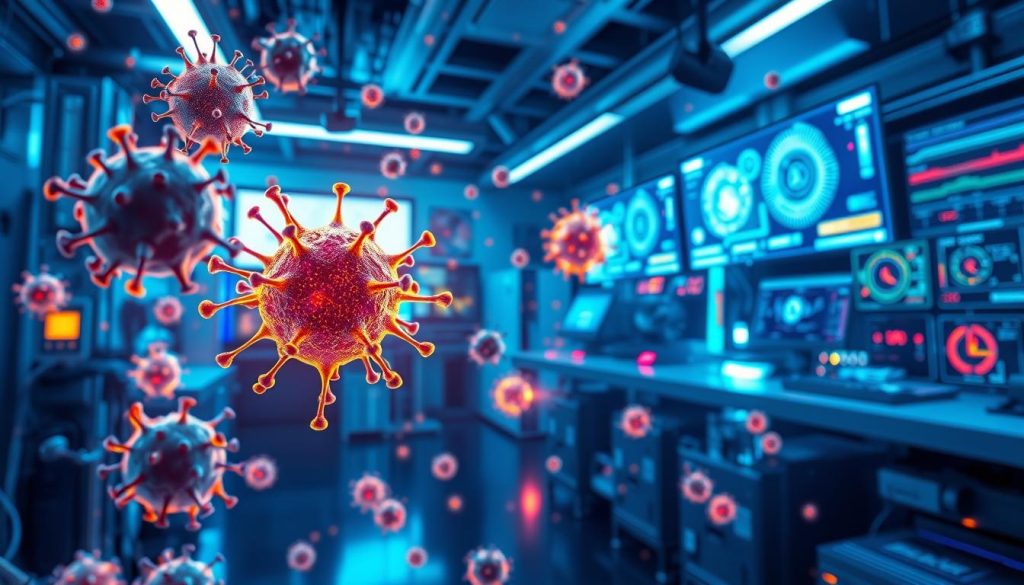
Next-Generation CAR Designs
Scientists are making new CAR T cells with cool features. They want these cells to be more precise, last longer, and fight tumors better. Some of these new features include:
- Dual-targeting CARs that recognize multiple tumor antigens
- Inducible CAR systems for better control over T cell activation
- Armored CARs co-expressing cytokines or checkpoint inhibitors
- Universal CARs compatible with allogeneic T cell sources
These new CAR designs could make treatments work better and last longer. They might also help avoid treatment failures.
Combining CAR T Cells with Other Immunotherapies
Researchers are also looking into mixing CAR T cells with other treatments. They think this could make treatments even stronger. Some ideas include:
- CAR T cells with checkpoint inhibitors (e.g., anti-PD-1/PD-L1)
- CAR T cells with bispecific antibodies or BiTEs
- CAR T cells with oncolytic viruses or cancer vaccines
By combining these treatments, they hope to make anti-tumor responses stronger. They also want to reduce the chance of the tumor evading the immune system.
“The future of CAR T cell therapy lies in the development of more sophisticated and versatile next-generation CAR designs, as well as the rational combination with other immunotherapeutic modalities to unleash the full potentia of the immune system against cancer.”
As research keeps moving forward, we expect big changes in how we treat cancer. Next-generation CAR T cells and new combinations of treatments could help more people. This brings new hope to those fighting cancer.
Accessibility and Cost of Anti CD19 CAR T Cell Treatment
Anti CD19 CAR T cell therapy is a big step forward in treating blood cancers. But, treatment accessibility is a big problem for many. The high cost considerations make it hard for many to get this treatment.
The process of making CAR T cells is complex and takes a lot of time. This makes the treatment expensive. The fact that it’s made just for each patient also adds to the cost. Not many places can give this treatment, making it hard for patients to get it.
People are working hard to make this treatment more accessible and affordable. They’re trying to make the process faster and cheaper. Companies, insurance, and healthcare groups are teaming up to make sure more people can get this treatment.
The table below shows how much CAR T cell therapies cost:
| CAR T Cell Product | Manufacturer | Estimated Cost (USD) |
|---|---|---|
| Kymriah | Novartis | $475,000 |
| Yescarta | Gilead Sciences | $373,000 |
| Tecartus | Kite Pharma | $399,000 |
To make this treatment more available, we need more places to get it. Training programs are starting to help more doctors and hospitals. This way, more people can get this life-saving treatment.
“Improving access to CAR T cell therapy is a top priority. We are committed to working with all stakeholders to make this life-saving treatment more widely available to patients in need.” – Dr. Sarah Thompson, Oncologist
As CAR T cell technology gets better, we hope more people can get this treatment. The cost should become less of a problem for those who need it.
The Future Landscape of CAR T Cell Therapy
The future of CAR T cell therapy looks bright. It could help fight more types of cancer, not just B-cell malignancies. Scientists are working hard to make this treatment work for solid tumors and other cancers too. They want to make CAR T cells even better at fighting cancer.
Researchers are also working on making CAR T cell therapy safer and more effective. They’re creating new CAR designs that are safer and more precise. This means fewer side effects and better results for patients. They’re also trying to make the treatment easier and cheaper to produce, so more people can get it.
The future of CAR T cell therapy is full of hope. It could change how we treat cancer and give new hope to patients. With ongoing research, we can expect big improvements soon. The hard work of scientists, doctors, and patients will help make CAR T cell therapy a game-changer in cancer treatment.
FAQ
Q: What is anti CD19 CAR T cell therapy?
A: Anti CD19 CAR T cell therapy is a new way to fight cancer. It uses T cells from the patient to target and kill cancer cells. This method is a personalized treatment that uses the body’s immune system to fight cancer.
Q: How does anti CD19 CAR T cell therapy work?
A: First, T cells from the patient are collected. Then, they are changed to recognize the CD19 antigen. These engineered T cells are given back to the patient. They find and destroy cancer cells with the CD19 antigen.
Q: What are the benefits of anti CD19 CAR T cell therapy?
A: This therapy has shown great success in treating B-cell cancers. It often leads to high remission rates in patients who have tried other treatments. It offers hope for long-term disease control, giving new hope to those with advanced cancer.
Q: Are there any safety concerns with CAR T cell therapy?
A: Yes, CAR T cell therapy can cause side effects like cytokine release syndrome and neurotoxicity. But, doctors closely watch patients and use strategies to manage these adverse effects. This ensures patient safety during treatment.
Q: Who is eligible for anti CD19 CAR T cell therapy?
A: Who can get this therapy depends on several factors. These include the patient’s age, cancer type and stage, and overall health. Careful patient selection is key to ensure the best results and safety. Patients should talk to their oncologist to see if it’s right for them.
Q: What does the manufacturing process of CAR T cells involve?
A: The process starts with collecting T cells through leukapheresis. Then, these T cells are changed to recognize CD19. After that, they are grown in the lab to make enough for the patient.
Q: How effective is anti CD19 CAR T cell therapy based on clinical trials?
A: Clinical trial data shows this therapy is very effective against B-cell cancers. Many patients have seen complete remission, with some having long-lasting responses. These results are often better than traditional treatments, making CAR T cell therapy a promising option.












